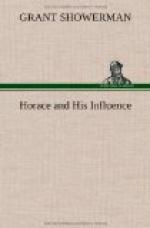The history of Roman literature from the end of the first century after Christ is the story of the decline of inspiration, the decline of taste, the decline of language, the decline of intellectual interest. Beneath it all and through it all there is spreading, gradually and silently, the insidious decay that will surely crumble the constitution of the ancient world. Pagan letters are uncreative, and, with few exceptions, without imagination and dull. The literature of the new religion, beginning to push green shoots from the ruins of the times, is a mingling of old and new substance under forms that are always old.
In the main, neither Christian nor pagan will be attracted by Horace. The Christian will see in his gracious resignation only the philosophy of despair, and in his light humors only careless indulgence in the vanities of this world and blindness to the eternal concerns of life. The pagan will not appreciate the delicacy of his art, and will find the abundance of his literary, mythological, historical, and geographical allusion, the compactness of his expression, and the maturity and depth of his intellect, a barrier calling for too much effort. Both will prefer Virgil—Virgil of “arms and the man,” the story-teller, Virgil the lover of Italy, Virgil the glorifier of Roman deeds and destiny, Virgil the readily understood, Virgil who has already drawn aside, at least partly, the veil that hangs before the mystic other-world, Virgil the almost Christian prophet, with the almost Biblical language, Virgil the spiritual, Virgil the comforter.
Horace will not be popular. He will remain the poet of the few who enjoy the process of thinking and recognize the charm of skillful expression. Tacitus and Juvenal esteem him, the Emperor Alexander Severus reads him in leisure hours, the long list of mediocrities representing the course of literary history demonstrate by their content that the education of men of letters in general includes a knowledge of him. The greatest of the late pagans,—Ausonius and Claudian at the end of the fourth century; Boethius, philosopher-victim of Theodoric in the early sixth; Cassiodorus, the chronicler, imperial functionary in the same century,—disclose a familiarity whose foundations are to be looked for in love and enthusiasm rather than in mere cultivation. It may be safely assumed that, in general, appreciation of Horace was proportionate to greatness of soul and real love of literature.
The same assumption may be made in the realm of Christian literature. Minucius Felix, calmly and logically arguing the case of Christianity against paganism, Tertullian the fiery preacher, Cyprian the enthusiast and martyr, Arnobius the rhetorical, contain no indications of familiarity with Horace, though this is not conclusive proof that they did not know and admire him; but Lactantius, the Christian Cicero, Jerome, the sympathetic, the sensitive, the intense, the irascible, Prudentius, the most original and the most vigorous of the Christian poets, and even Venantius Fortunatus, bishop and traveler in the late sixth century, and last of the Christian poets while Latin was still a native tongue, display a knowledge of Horace which argues also a love for him.




